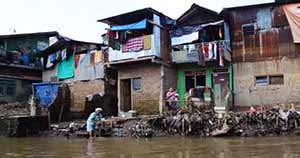Data dump
“You have all manner of garbage floating past you; sometimes mattresses, sometimes dead rats,” says Frank Sedlar, MSE ’15/BSE ’13. “And you never know what you’re stepping on.”
 Sedlar is describing the state of the Ciliwung River in Jakarta, Indonesia. Quick and severe flooding is a dire problem there. Excessive trash dumping in the Ciliwung exacerbates the issue, clogging flood canals and reservoirs.
Sedlar is describing the state of the Ciliwung River in Jakarta, Indonesia. Quick and severe flooding is a dire problem there. Excessive trash dumping in the Ciliwung exacerbates the issue, clogging flood canals and reservoirs.
As a civil engineer interested in complex urban systems, Sedlar was drawn to Indonesia’s capital city. He knew Jakarta would serve as a compelling case study on the convergence of the world’s urban population with the effects of climate change.
“I quickly discovered there was very little data about the amount of garbage in Jakarta, much less where this garbage was coming from,” he says. “With the data I’m gathering we can begin targeting clean-up efforts on the communities that are throwing the most garbage into the Ciliwung.”
The government has very limited resources to put toward waste management in the poorest communities, Sedlar says. So the data he collects could help lead to installation of dumpsters and regular garbage collection in specific areas.
“I see garbage as a very underappreciated area of research,” he says. “Every city has an enormous amount of garbage that everyone generates every single day. I’m interested in the ‘back-end’ of the garbage question. Where does it come from? Where does it go? And how do we handle it eventually?”
Tracking the trash
In this striking video, Sedlar describes how he developed a system combining time-lapse cameras and computer-vision algorithms (similar to the ones used by cell phone cameras to detect faces) to better understand and hopefully offset flooding in overpopulated megacities like Jakarta.
Sedlar also has been designing and prototyping emergency flood shelters and using drones to map informal, flood-prone settlements.
He recently was named a Fulbright Fellow to Indonesia where he will work with PetaJakarta.org and the DKI Jakarta government to coordinate an Urban Drone Research Program.
See more MconneX videos produced the College of Engineering.



irene dabanian - 1974
Great idea to track garbage and offering dumpsters but getting anyone to collect garbage from the dumpster and haul it to a dump is another story. Little resources are the right words here. What will you do to insure garbage will be properly collected and taken to a dumpster? Maybe your research will show officials that it is more cost-effective to provide garbage removal than to flood, and clean up clogged canals…things take a LONG time to change but it is a great project.
Reply
Karen Morgan - 1969
Cairo, 2010, same problem. People coming from country we were told don’t know about waste disposal, dump in canals throughout city. City provided dumpsters, but people left the garbage beside the dumpsters. The city planned to fill canals. History intervened I imagine. I hope you have good luck with your project.
Reply
Felix Tio - 2013
Hi my name is Felix Tio as a Indonesia Umich Alumni I felt that this is a great work and I would really connect with the person involved in the project. It would be great to discuss on the follow up on the project as I think this is a fundamental problem in Jakarta, the place where I was born. I hope you would reply to this message and I thank you for showing this problem to the campus community.
Regards,
Felix
Reply
Aksi Cepat Tanggap - 2015
I’m from Jakarta
The flooding problem is due to the behavior of low public knowledge of town planning and rivers damaged
Now the Mayor of Jakarta force for orderly city
Care and disaster response http://act.id/
Reply